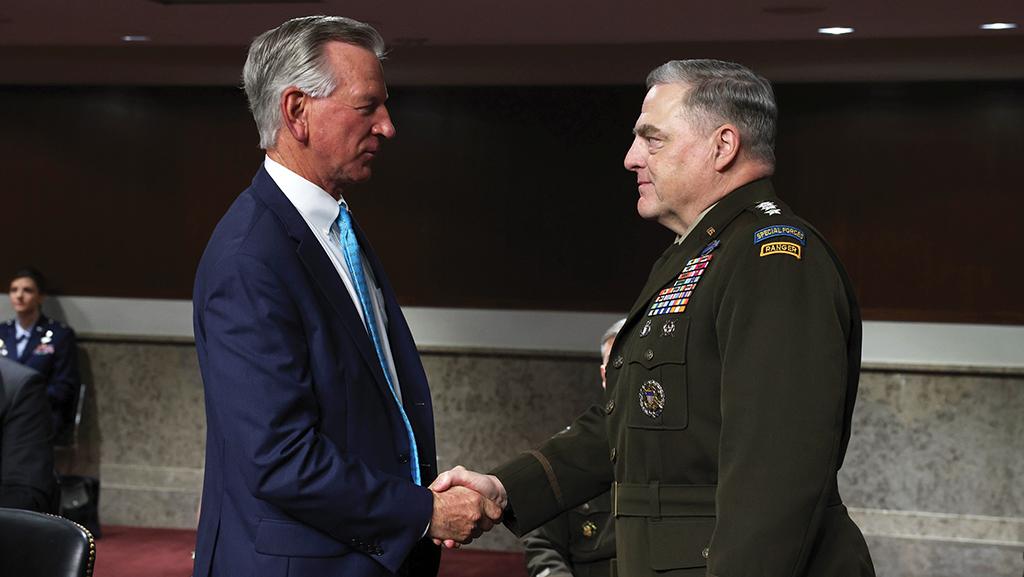Editorial: End The Hold On U.S. Military Promotions

Sen. Tommy Tuberville (R-Ala.) (left) has placed holds on the nominations of more than 300 nominees, including the general named to replace Army Gen. Mark Milley (right), chairman of the Joint Chiefs, who plans to retire this fall.
The U.S. military has a problem. Its cause is not a Chinese surveillance balloon, the Russian nuclear threat or terrorists funded by Iran but a body located less than 5 mi. from the Pentagon. It is the U.S. Congress—the 535 democratically elected representatives and senators charged with funding and approving policy for the nation’s defense.
Congress has embarrassed itself multiple times during the last two decades by failing to approve annual defense spending by the Oct. 1 start of the new fiscal year, forcing the Pentagon to rely on stopgap funding. But now a freshman senator from Alabama is making things worse, and setting a dangerous precedent in the process.
Sen. Tommy Tuberville, a Republican, has put a procedural hold on the nominations of more than 300 military officers, leaving the U.S. Army, Navy and Marine Corps with no confirmed chief. The former football coach at Auburn University is taking issue with a Pentagon policy that pays for time off and travel costs for servicemembers’ medical treatment because that policy applies to women seeking abortions.
Aviation Week is not in the business of weighing in on social issues, and we are not about to start. But we cannot ignore the mounting pain that Tuberville’s hold is inflicting on the U.S. military apparatus after five months. Army Gen. Randy George, Navy Adm. Lisa Franchetti and Marine Corps Gen. Eric Smith are vice chiefs moonlighting as the heads of those services. And if the hold continues into October, when Joint Chiefs Chairman Gen. Mark A. Milley is up for retirement, the military may have no top officer. The nomination of Air Force Chief of Staff Gen. Charles Q. Brown, Jr., to replace Milley may be stuck in limbo, awaiting Senate confirmation.
In fact, more than 100 officers in the Air Force and Space Force are caught up in the chain of stalled promotions. Breaks in these linkages—at Air Force Futures Command and at the Space Force’s strategy shop—could begin to affect planning for the next budget cycle.
One of those officers is in charge of defending the U.S. homeland. Air Force Gen. Glen VanHerck has already stayed in his role well past the typical end date as the leader of U.S. Northern Command and the North American Aerospace Defense Command. Twenty-five officers have deferred retirement until the holds are lifted or until Dec. 31. Lt. Gen. Gregory Guillot, the deputy commander of U.S. Central Command, has been waiting for confirmation of a successor since June. By year-end, 650 general and flag officers could be stuck in the confirmation pipeline.
The impacts of the hold were on display during a major military conference in Tuberville’s home state in August. The Space and Missile Defense Symposium in Huntsville brings together top leaders from the Army’s Space and Missile Defense Command, the Missile Defense Agency and other military commands.
This year, many of the speakers at the symposium were in jobs they were expected to leave for a promotion or spoke in an acting capacity. Officials were hesitant to make waves in speeches or take questions. Vice Adm. Jon Hill, former director of the Missile Defense Agency, has retired, and Rear Adm. Doug Williams is filling in, leading the agency’s $11 billion annual budget on an acting basis. Air Force Maj. Gen. Heath Collins, nominated to replace Hill, could not speak about the future direction of the Missile Defense Agency, only about his current role leading the agency’s test efforts.
This is not to overemphasize the impact of Tuberville’s hold. The Pentagon will find a way to function, and the mighty U.S. national security apparatus is not about to crumble. The bigger danger is that Tuberville’s holdups could set a precedent for other lawmakers to take military promotions hostage. What if in a future Republican administration a far-left senator placed holds on military nominations over concerns about climate change, for example?
It is time for Tuberville—and the Senate—to grow up and find a way to end this impasse when they return to Washington from their summer break on Sept. 5. And if he will not relent, it is time for leaders of both parties to change the chamber’s rules so the work of the nation’s warfighters can proceed as usual.





Comments